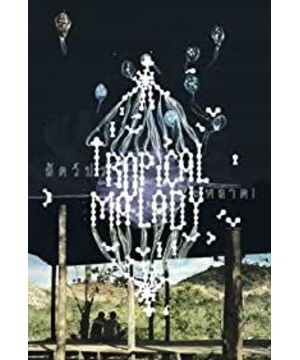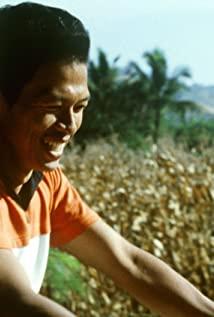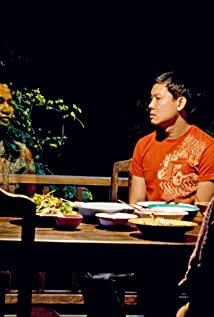One note: I just finished reading the memoir "Life Outside the Coconut Shell" by Benedict Anderson, a well-known scholar of Southeast Asian studies, and accidentally discovered that he had written a film review for "Tropical Diseases" and had a personal relationship with director Apichatpong. The original review was in English and translated into Thai by Mr. Anderson's student, Mukhang Onthesa. Because I like Professor Anderson's book and "Tropical Diseases" very much, I found Thai translation into Chinese. The translation is not very strict, but you can take a look at it as a supplement to "Tropical Diseases"!
text:
After a lecture and exchange meeting with about 100 teachers and students at Thammasat University last year, I took the opportunity to ask if anyone had heard of the director who became famous for his work "Tropical Diseases"---Abi Chabang Velascu, please raise your hand. I was amazed to see only 15 people in the audience raised their hands. And when I asked who had seen the movie, only 8-9 people raised their hands. How is this possible?
In 2004, Mr. Apichatpong won the Special Jury Prize at Cannes, an important film festival of international renown. This is no fluke. As early as two years ago, Mr. Apichatpong won an important award for "Blessing" at Cannes. So we took it for granted that the people of Bangkok, who once called Tiger Woods, who didn't speak Thai, an "international Thai" should at least be proud and excited about Mr. Apichatpong's exciting success, but no . The question is, why is this so?
If you've watched A Longkod's witty and witty pseudo-documentary "They Said They Think Tropical Diseases Are a Problem," the answer will begin to emerge. The pseudo-documentary reminds viewers that Tropical Diseases will only be shown in three theaters (Bangkok area only), and each theater will be released for only one week. Why is this so? In some brief interviews, Bangkok's not-yet-famous figures and the media have repeatedly praised the film as top-notch, very interesting and above the level of other Thai films (they were just reacting to Cannes rather than for the movie itself). But when it comes to the surrealism and mysticism of "Tropical Illness", it directly exposes the fact that they don't understand the film at all. Of course, this group of people who didn't understand it included those who believed that releasing the film in a foreign country would be useless and a waste of people's brains.
In addition, the pseudo-documentary also interviewed four rural teenagers, two men and two women. When these rural teenagers made a special trip to Bangkok to watch the special screening of "Tropical Diseases" organized by Alliance Francaise, the interviewer did not explain to them the views of Bangkok intellectuals about the film's "difficult" and "mysterious". Then ask them if they thought the film was too obscure. The interviewees answered without exception that nothing was particularly difficult or mysterious, and hoped that the film would be released in the countryside where they lived. They understood the film very well, and their thoughts on the film are explained in more detail below.
Before I get into the question of why people in Cannes and the countryside love this film so much, but people in Bangkok don't, I should report on my recent trip with Mr. Mohon Vent and Mr. Andaton Inkavani. The collection of amateur short-term field information research. We spent two days interviewing VCD shop staff in Chonburi, Longzai, Yakong, Ratchaburi, Suphan Buri, and Ayutthaya in the semicircular area near Bangkok. These stores can be divided into two categories. The first category is rental VCD shops, mostly located in urban centers; the other category sells genuine video tapes or low-cost pirated video tapes, often located in shopping malls. What have we found? First of all, except for a very small VCD shop in Suphan Buri province, our interviewees knew about Tropical Diseases, and many shop shelves had this VCD on display. And how did they know about the film? Not from newspapers or magazines, but from television. The most interesting thing is that they listed this video more due to customer request. When we asked them about the type of customers who were interested in Tropical Diseases, the most common answer was "Oh, there are all types, and most of them came together as a family." Some staff responded, "Professional youth. Men and women" are about 20-30 years old, not teenagers. But some said they had also encountered teenage customers asking about the film. What is the public feedback on this film? Not bad, so-so, just like that, not very prominent, but not really bad either. A male clerk told us that most of the customers were men, but other clerks said there were both men and women. Strange, isn't it? (It is worth noting that these people are not rural people, but people who live in the small central city of Waifu, which is 1-2 hours away from Bangkok.)
The film "Tropical Diseases" tells the love story between two men, Keng, a handsome young man, and Tong, an employee of an ice factory. This story takes place in the Waifu, and shows the process of the love between them slowly warming up, which seems plain and ordinary. It's embarrassing and has no Thai flair for some Bangkokians.
Now we're ready to go back to the film itself with some context and explore some of the deeper stuff. Aside from the somewhat confusing beginning of the movie (a group of soldiers stumbles across a body in the jungle, while in the distance near the jungle a naked male figure moves through tall grass), the first half of the movie is about handsome The story of a soldier (Keng) who pursues a boy (Tong) who works in a city ice factory. They never got naked, never kissed, let alone a sex scene. But the film clearly pushes the bond between them through multiple scenes in small cities and villages.
In "They Said They Think Tropical Diseases Are Problems", the interviewer also pretended to be a middle class in Bangkok to interview four rural teenagers about this courtship story from multiple perspectives. For example, "Are there any men in the outer palace who like men?" The rural teenagers replied bluntly: "Yes, it is very common." Everyone agreed that Tong and Keng were truly in love, and the shy country boy also commented on the relationship between them. Courtship is very "romantic". Another girl, with a big smile, commented that the scene of Keng sleeping on Tong's bed gave her goosebumps. The interviewer pretended to be surprised by the answers, and asked the country girl if she thought Keng was a ladyboy. "Can a soldier still be a ladyboy?" She laughed lively, "A soldier who is a soldier can probably be a ladyboy." What about Tong? "It's...cute...should be...about the same." Obviously, what the pseudo-documentary tries to tell the audience is that such love between two men in the outer palace is very common. And for some part of Bangkok people, it's "Western-style", "embarrassing" or simply "unlike Thai" (in the pseudo-documentary, before "Bangkok" used "shemale", rural teenagers They all call them "men" or "people". They never call Tong or Keng a ladyboy)
(Note: กะเทย is an insult in Thai, and so is a ladyboy. Not recommended.)
All in all, the audience can quickly recognize the salient features of the film when watching the first half of the film - the background of the film has no foreshadowing music, only the sounds of daily life in Waifu, the sound of motorcycles, the barking of dogs, small tools The noise of work, etc., as well as the mundane and real voice of conversation. Nor do we have to pay attention to the content of those conversations. The first to be highlighted is the emotional face, body language, silent communication through eyes and smiling lips. The old woman, who Tong calls her mother, shows with expressions and gestures of approval that she understands the love (before Tong and Keng) is going on, but she doesn't say anything. No one in the village said anything. Audiences in Bangkok who don't notice the fantastic background sound may arbitrarily think the first half of the film is too rustic, and start wondering when the two men will be able to undress and embrace each other.
Regardless, these audience-viewing puzzles generally arise in the wow-worthy second half of the film, the part where there is little dialogue. In the second half of the film, Keng enters the jungle alone to follow the monsters that devour the cattle and sheep in the village. In this second half, the background sound of the movie is very important. Most of the sounds we could hear were from the jungle and Keng in action. When he was about to go deep into the jungle, most of the scenes were night scenes. When he is tracking the footprints of the human beings ahead, which may also be scary monsters, the movie also reminds the audience that the footprints belong to a certain animal, and that animal is the tiger spirit. But it is also Tong's footprint. In the end, Keng was attacked by the silent tiger spirit with tiger stripes on the humanoid face. At this time, the audience should realize that the naked figure seen at the beginning of the movie is Tong. After a fierce close fight, Tong was the victor. He dragged the unconscious Keng to the edge of a cliff and pushed him off. Although Tong never meant to kill Keng (let alone eat it) Keng was not injured. We see the last scene of Tong, he's standing on the edge of a cliff, as if to make sure Keng isn't hurt. For the rest of the film, viewers can see Keng continuing to track and experience a number of paranormal events (such as the half-eaten half-eaten half-eaten cow standing up again intact and heading towards the jungle and disappearing; Advice from the Spirit Monkey) etc.) The film ends with Keng kneeling on the ground facing the silent giant tiger standing in the tree. We can hear his inner monologue - monster, take it, my soul, flesh and memory, hear? Every drop of my blood is filled with our happy songs.
How would you rate this second half? When I screened the film for educated gay Filipinos in Manila, they were quick to share their thoughts—it's in another horror genre of Asian horror, and it's about to catch on. This type originated in Japan and spread to South Korea, mainland China, Indonesia and the Philippines. This is different from the reaction of the village teenagers interviewed by ALongKot. The two kids had the experience of living in the jungle and told us it felt like it was in the movies. Scary, exciting, and sometimes creepy. They had never seen a tiger spirit before, but were convinced that "there was" a tiger spirit before. Only the end of the film confuses them, they think it's too short, as if it's not over yet.
A more interesting response came from my Indonesian Dayak friend Ben Abel. He was raised by his grandfather. The Dayak people lived in the jungle world untouched by the outside world 30 years ago, and believed in ghosts and gods. When I asked him if he found the film difficult to understand, he replied, "It's not difficult, I understand everything in it." Ben used to go hunting with his grandfather, friends, or alone in the woods, including in the middle of the night. He was able to imitate sounds like animals or birds in the background of a movie right away. "The jungle is where you have to be silent and listen at all times, and you need to keep yourself as silent as possible. Yes, that might be scary, but The jungle is also like a weird and magical world inside of you. You want to go back to it, you know you're testing yourself and you're learning about yourself."
When I discussed tiger spirits with him, he told me some very interesting things, which just confirmed what Master Nithi Iew Siwong told me about his childhood. "True tiger spirits are always male. Only male souls have the power to change form at will. They may appear in tiger form, but within the tiger's body reside human souls. Generally, they are fleeing Human form only appears at critical moments of danger. Most of these dangers are caused by humans. Another tiger spirit is female, but ghost, not human. She may appear in tiger form. The experienced one is older than Keng The scene of the soldiers vigil at the edge of the jungle was a bit incomprehensible at first. A woman appeared and told the soldier that she was going home. Because the jungle at night was too dangerous for a woman, and when she turned to leave, the soldier found There is a long tiger tail sticking out of her skirt. It can be assumed that this scene is to show that this tiger spirit is a ghost and Tong is a human.
My friend went on, "You know what? If you grew up like me in the jungle or near the jungle, where the human world and the animal world are almost borderless, you'll start to understand all kinds of sounds, birdsong, Cocooning, mating, running away, warnings, all that. Besides, you can go from one world to another. My uncle, who just died, came back to this world as the sound of an owl at night. After falling asleep, people You can get out of your body and bring back some news, some will be in a dream." He added his thoughts on the second half of the film. Keng was looking for something, maybe the answer to that part of him that he didn't know about himself, Tong and the rest. "The most magical thing about the end of the film is that Keng's love is so deep that he can give 'his soul, body and memory'. It can be said that in the spiritual world, unlike the other world, his soul is seeking Tong soul." Finally he said to me, "This is the most amazing movie I've ever seen. I can't believe anyone could make a movie like this now. It's so deep into the world I grew up in and it's so perfect. Restored. I have never seen such a masterpiece."
Last summer, I was invited to a scientific conference in Fortaleza. Fortaleza is a remote coastal city in northern Brazil facing a vast tropical jungle known as Sertao. Sertao is the source of many legends, including Brazilian films. I've seen some amazing things at museums in the city. The theme of that small exhibition was books that were too small to be 20 pages long. The cover of the book has rough print. Most of these little books are collections of poetry that are sold to the poor at various bus stops. The packaging is beautiful, but generally not signed. The content is generally about famous revolutions, massacres, or miracles that happened in the past. But the book also devotes some paragraphs to some compelling love stories. Lack of happiness for little girls and their sheep, cowboys and horses, the love before donkeys, and so on. When I asked my highly educated friends, they responded more like a Bangkokian, "It's like this, the grasslands and pastures of Sertao, where there are no women, men have to have sex with other men, or with their animals. Or what else?" (Other men, animals, monsters!) All I can say is that my friend said these things are too unbelievable, "What about the poor little girls and their sheep? Those who cut them out of jealousy What about the women who broke the neck of their husband's horse? All I can say is that the cowboy didn't have sex with his horse, just in love." "hmmm...hmmmm...I know what you're trying to say!" Just, I wanted to say what?
Personally, if Mr. Apichatpong tried his best not to make films directly related to the rural world of Thailand, but to start from the core of that world, the core of rural culture, and his own thinking about the rural world, then we would be able to clearly understand. If you understand the intention of interviewing rural people in the film "They Said They Think Tropical Diseases Are Problems", you can clearly understand the intention of "Tropical Diseases" and feel its invitation. We can understand why many contemporary people living in Bangkok and living in air-conditioned rooms all day find this film "difficult" and "mysterious". These urbanites are only used to movies about themselves or people whose social situation is better than theirs. These films are interspersed with rednecks, just to be down-to-earth, or just to be funny. They don't think it's strange that "Taxi Driver", in which the male protagonist is a poor northeastern youth, is played by a handsome and lovely Bangkokian with thin skin and tender meat. They think the eye-opening fighting art in "Fist Fighter" is funny. As for "Backwater", I just heard the opinion of a girl who just came out of the movie theater with exquisite dress. She said regretfully: "It's a pity that the male lead is not handsome." To a certain extent, the middle class in Bangkok Love movies with elements of traditional Thai legends. To meet this standard, it has to be a version familiar to the public. The audience must have the ability to distance themselves from those myths and legends, as if an anthropologist were gazing at the cultures of other nations. Better yet, is the latest version of Nana, which takes a familiar, or at least roughly known, rural horror story into a version that appeals to the tastes of Bangkok's middle-class TV. "It's a love movie!" No wonder. From this we can see the cunning of Mr. Apichatpong. Tropical Diseases is also a legend, although the legend is not well known to the general public. Mr. Apichatpong insisted on keeping the "Bangkok" style out, and emphasized that the core of the film is that men love men (rather than Thais loving Thais). Just imagine what would happen if "Nana" was adapted into "Nana Boy" how? It must have left the two monks scratching their heads.
I think there is a smarter solution to the puzzle of interest in this short article, the core of "Thai". Years ago, the book Jek Pon Lao expounded on Mr Suji Vint's groundbreaking theory that overturned the old view that "Thai culture is derived from a mixture of ancient Chinese and Laotian cultures, not from ancient times" Turned out. As far as I know, Mr. Suji Winter was surprised to receive these letters of sincere gratitude from readers. These readers were encouraged by the positive affirmation of "Thai" (including) "Chinese" culture by Mr. Suji Vent. This emotional response is reminiscent of the gay community's response to the first novel to include an attractive gay character. "Finally, we appeared with a respectable and honest image." In the 1990s, many novels reflected the spirit of Chinese voyages to Nanyang. The Chinese who set foot in Thailand have a lot of proud history, culture and descendants. What is uncertain is that this book is also read carefully by many people in prisons or not. We still hope that the "Hua" culture can get its rightful place in Thai primary and secondary education.
Bangkok in the 19th century was still an overwhelmingly Chinese city. Although prior to World War II, Bangkok's workforce consisted mostly of poor Vietnamese and Chinese refugees, before the huge wave of population from the Northeast slowly moved towards Bangkok. Today, almost all of Bangkok's successful middle class are descendants of Chinese, and most of the upper classes or those who don't have to worry about food and clothing are also Chinese, but this fact is not known to the public. In most of the world, the rich in successful cities will be culturally alienated from the countryside, albeit irrespective of race. But there are two levels of this alienation in Thailand due to the wealthy people of different races.
We can imagine that, like the rest of the world, the Chinese middle class is actively and ambitiously seeking higher social status. They always have a tendency to integrate into the upper social civilization or the government (at least the same level). The House of Lords in London today is filled with successful middle-class people who would love to be Duchess of one kind or another. In Bangkok, there are many Chinese women who want to be Mrs. Because of this, to a certain extent, middle-class Chinese are deeply influenced by Thailand's "orthodox nationalism", especially official performances on TV and propaganda such as "River of Kings". They can see themselves on talk shows and TV shows like Dead Water. But the Thai upstarts do not have Chinese descent. This isn't the only thing that's unpleasant. These middle-class Chinese people are uncomfortable with the popularity of movies like Tom Yum Kung. (Like "Taxi Driver") because the Chinese play greedy, evil characters in it - to a certain extent racism against the Chinese.
I think the reason why "Tropical Illness" is particularly "difficult" for middle-class Chinese today is not only that they didn't appear in the movie, but more because "Tropical Illness" will underlie their ancient roots and "Thai culture" Centrally displayed. These are all very different ends from which their life experiences have alienated them. To think that the film "flatters the West" is like threatening the film to tout the credibility of "Great Thaiism". A lot of people are still kidding themselves about this. Since Bangkok's upstarts are the largest consumerist group in Western culture, this may require us to return to what is half-sarcastically, half-proudly called the largest Chaoshan school in the world, Thammasat University (and Chulalongkorn University). If my discussion in this article is correct at one point, it helps to explain the ignorance and indifference of teachers and students about Tropical Diseases that struck me at the time.
Readers may notice that I have emphasized "contemporary" several times above. The reason I'm doing this is because I'm curious about the huge alienation that Bangkok's middle class has created from Thai culture, which is relatively new. Mr. Apichatpong once mentioned his gratitude and love for jungle adventure novels (many are imitations of Conan Doyle). These novels were written by Noh Inthanon in the 1950s before the legal or illegal mass destruction of the ancient jungles of Thailand. In these legends and contemporary backgrounds, tiger spirits are real animals, although they are "monsters", although Mr. Sack, the protagonist, has a more scientific worldview. Most of Noh Inthanon's readers are teenagers, possibly men, city dwellers, Chinese, Mon, Laotians. At the same time, these people may also prefer to study science rather than watch TV, choose to watch movies in crowded movie theaters rather than get lost in the online world, live a happy life without air conditioning like everyone else, and live a happy life without air conditioning in the general globalization of cultural consumption. in an atmosphere of ideology without being restrained. To a certain extent, such an old-fashioned middle class still exists in Longzaicuofu and Yegongfu, but it may have disappeared in the City of Angels (referring to Bangkok).
What remains to be scrutinized are the Bangkok commentators and media—the intellectuals who say they love "Tropical Illness" but don't really understand the content. In this regard, I benefited a lot from the conversation with Mr. Adaton Inkavani, who was about to study "Thailand Traditional Films" (Thailand's upstart Thai and International Cultural Traditional Films). I mentioned earlier that the media in Bangkok are paying attention to the trend of Tropical Diseases winning high international awards. They often see it that way. These awards mean that Thailand has the ability to make films of international quality; their acceptance of the film means they are also of international quality. The difficulty in their formula is that the concept of "international" sometimes has contradictory meanings. Sometimes "international" means that foreigners praise and love certain Thai movies, but which ones? Somewhat embarrassing, because these successes abroad mean that when foreigners think of Thailand, they can only think of ghosts, Muay Thai, and transgender people. and ghost movies. Sometimes "international" means foreigners sponsor the production and promotion of "good Thai films", a good example is the positive contribution made by famous Hollywood director Francis Ford Coppola for the film "Suri Yat Thai".
Tropical Diseases looks like a way out of trouble. It has received compliments from domestic and foreign media, film experts, and people with higher education. It's fine to call these people "people like us", but unfortunately not many of these people are "people like us" either. Because their circumstances are not the same. They watch movies of varying tastes in New York, Tokyo, Paris, Berlin, London and Toronto, they are familiar with the time-honored differences in customs caused by various geographies, and they do not have any hope that they must "understand" movies unmistakably and thoroughly. Thus a culture called "multiple readings" was born. They can watch all kinds of complex films, those about modern urban life alienation, homophobia, French comparative politics in the 1950s, etc., like Bresson's grasp, without excluding each other's interpretations or determining what already exists. The intellectual investment is reflected in the aesthetics of the film, and intellectuals in France, Japan and Toronto have made achievements.
Such investment is a big challenge for Thai intellectuals who hope that Thai films can naturally have international standards and retain Thai characteristics. This means that this investment must uphold pure nationalism. In fact, this is also a constraint on the internationalization of Thai films. Fundamentally, this investment is political, so there will be antagonisms, both overt and covert. The contrast between "pure Thai" and "multiple interpretations" is obvious. Foreign talents like Cannes jury jury Quentin Tarantino were able to spare no effort in complimenting Tropic Illness's contradictory and complex narrative skills, gleefully saying, "It's an amazing film, I don't understand it." But This attitude is not easy for Bangkok's intellectuals. Because they're in the awkward position of not being able to say "this is a great movie" and "I don't understand it." They have to understand it unmistakably because they are "good Thais". Their situation was further embarrassed by Mr. Apichatpong's firm remarks in the interview, as he determined that the film was fully Thai from start to finish, with roots in Thai traditions. Add in all the popular Thai films, although not as formally nationalistic as the official show "River of King," and Bangkok netizens may find it hard to understand why a nationalist product such as "River of King" is so expensive to create. Su Li Yaotai, which is not up to international standards, is just a boring, exotic film that only anthropologists are interested in. There is nothing in the whole film of "Su Li Yaotai" that is separated from the Thai people. Needless to say, these middle classes cannot understand that official patriotism in their country is merely "exotic" on the world stage.
What is the reason for this? One possible explanation is that Thailand is unable to differentiate the Thai tourism industry from the international film industry. The Thai economy has been a huge success (in terms of income). Thailand attracts countless tourists who want to take advantage of their short vacations to have fun, with Temple of the Emerald Buddha, Phanom Ran, Sukhothai, and even the ruins of Ayutthaya, plus Parthia, Koh Samui and Phnom Penh. Kojima, and Thai food, Thai hospitality, and the sex industry make up the attraction. But these pleasures seem too short-lived and frivolous, suitable only for tourists. The stay of these tourists in Thailand forms a limited market. On the other hand, the entertainment and leisure of these tourist groups consisting of backpackers, retirees, Japanese businessmen coming to recuperate, etc. has nothing to do with the "international movie viewing standard". Therefore, those tourists who are willing to buy tickets to see the Temple of the Emerald Buddha but are not interested in "Suri Yaotai" are well understood. And audiences at the Berlin Film Festival or the Rotterdam Film Festival don't see themselves as tourists.
Perhaps, that's why Bangkok's intellectuals are in trouble. On the one hand, they have the obligation to speak out for Thai culture, and at the same time, they are also part of international culture. Since the international mainstream praised Mr. Apichatpong, they also wanted to praise him, but they could not adjust their mentality to accept the fact that they "don't understand". Of course, they should understand Mr. Apichatpong because they are Thai anyway. "We love Mr. Apichatpong because we understand him" is an understatement. "Tropical Diseases" is "difficult" and "mysterious", but as Thais, we can understand him. But in fact, "we" can't understand.
There is no doubt that Mr. Apichatpong enjoyed it all, which is why his film's title is so perfect. At this moment, in this Thailand, who is the monster? It's a bit of a dilemma, isn't it?
View more about Tropical Malady reviews









